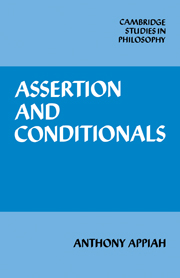5 - Truth conditions
Published online by Cambridge University Press: 07 October 2011
Summary
even though in a sense truth-conditions don't need to be mentioned in specifying the functional roles of … beliefs, those functional roles determine the belief's truth conditions.
(Loar, 1980: 67–8)OVERVIEW
In this chapter I wish to draw together conclusions about the way the conventional notion of a truth condition fits into the framework of a functionalist theory as I have set it out. I want to consider whether, as Loar puts it, the truth conditions of beliefs are determined by a functionalist theory; and to draw some consequences of the fact that the resources available to a functionalist theory are more limited than those which classical accounts of truth conditions take for granted.
A functionalist theory of the mind looks to individuate mental events by their functional roles: by their causal antecedents and consequences within and without the mind. Mental states are characterised by the way in which they determine the functional roles of mental events. When we approach an account of the sentential attitudes – those psychological states, like belief, desire, hope, and so on, the English verbs for which take sentential complements in ‘that’-clauses – we are left with a problem. For the sentential attitudes seem to have the general form of a relation between an agent and what philosophers have called a proposition.
Information
- Type
- Chapter
- Information
- Assertion and Conditionals , pp. 100 - 120Publisher: Cambridge University PressPrint publication year: 1985
Accessibility standard: Unknown
Why this information is here
This section outlines the accessibility features of this content - including support for screen readers, full keyboard navigation and high-contrast display options. This may not be relevant for you.Accessibility Information
- 1
- Cited by
